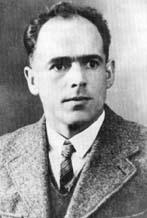On 21 November 2007 Pax Christi held Mass at Westminster Cathedral, London, to celebrate the beatification of Franz Jägerstätter. Bruce Kent, in his moving speech at the service quoted Osman Murat Ulke -- conscientious objector from Turkey -- who through Payday had written a message to Bruce Kent. Following the service, the ambassador from Austria spoke about the hardly-told story of Austrian refusal during the second world war. For more of the London ceremony see here.
Bruce Kent's speech here Ambassador Matzner-Holzer's here Report of the beatification in Austria here

Not
in a soldier's name
Paul Oestreicher, The Guardian, 21 March 2003,
He wasn't a pacifist. He'd done his military training. Franz Jägerstätter was a devout Catholic, a peasant farmer with a wife and children. He knew the difference between a just and an unjust war. When Hitler attacked Russia, he said: "This is aggression. I will not serve." Not even his patriotic bishop could change his mind. He knew the cost: imprisonment and execution.
Today, as his widow celebrates her 90th birthday, that bishop's successor is asking the Pope to beatify him. Had Hitler won, he would still be dammed as a traitor. The church, as religious institutions tend to do, bends with the prevailing wind.
At Nuremberg, Hitler's foreign minister Ribbentrop was executed for waging an aggressive war, but so too were his top generals, Keitel and Jodl. The fuhrer's orders were not accepted as a valid defence. They had beheaded the conscientious objectors; the leaders were hanged. Who were the true patriots?
Today in Israel, some children of Holocaust survivors, though only too willing to defend their country, refuse to be part of a brutalised occupation force. As many as a thousand reservists are refuseniks, with as little support from the rabbinate as Jägerstätter had from his bishop. Reviled by many, they are surely the true patriots and heirs of the uncomfortable prophets of Israel.
The same dilemma now faces the men and women of the US and British armed forces. "Theirs not to question why, theirs but to do and die," will no longer wash. Many of them are Christians. The issue is both legal and moral. Christian leaders in the US and in Britain - and worldwide, across all denominational divisions - oppose this war; so do eminent military men. Desmond Tutu stands alongside Jimmy Carter. They say no. There is something like a global consensus that a preemptive war, with no UN backing, is unwise, immoral and illegal.
Interviewed by television crews in the desert, the officers and men on the frontiers of Iraq put a brave face on it all. "We're here to do a job." But killing, and being killed, isn't just a job. At least, some of them know it. Once in the service, it is very, very hard to quit. Comradeship is no mean virtue.
But in the US, it has become an issue. The Quakers, in North Carolina, have established a hotline to counsel disturbed members of the armed services. It is much in demand. Many Americans are devout Christians. Do they listen to church leaders, or do they follow their fundamentalist president, who still believes in crusades? It is tragic and ironic that Christian fundamentalism plays unwittingly into the hands of the Islamic fundamentalism it purports to despise.
The New York-based, veterans' association, Citizen Soldier, estimates that, of the 1.4m service men and women, around 1,000 each year seek to leave the forces on grounds of conscience. As many as 20,000 have sought advice during the past year. The memory of Vietnam still weighs heavily. We, in contrast, have forgotten Suez. Our cause cannot simply be presumed to be just.
Most military chaplains are understandably reluctant to wrestle with this problem. They are both pastors and serving officers, and hardly trained to be prophets. Soldiers are trained to obey. Yet even military law makes it illegal to obey an illegal order. And even a legal order may conflict with an informed Christian conscience.
The issues raised are of great moral complexity at one level; at another, they are simple. To win this war may prove relatively easy; to win the peace will not. The winners will appear only before the court of world opinion; the losers alone will stand trial. But all will be the losers if war is once again held to be the legitimate pursuit of political ends by other means.
A few, whose names we may never know, will have refused to fight. At a level that embraces and transcends politics, we may all be in their debt.
Canon Dr Paul Oestreicher, former director of the centre for international reconciliation at Coventry cathedral, is a vice president of CND